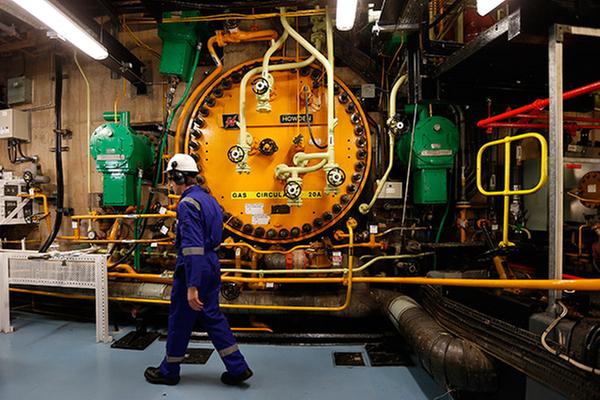CGN powers up with big UK changes
By Chris Peterson and Wang Mingjie in London | China Daily | Updated: 2017-06-16 08:14
 |
| A worker walks past a gas circulator in the turbine hall at EDF Energy's Hinkley Point B Nuclear Power Station in Bridgwater, southwestern England. [Photo/Agencies] |
Formation of trio of new companies part of thrust to expand in Britain
China's goal of boosting its nuclear technology sector took a major step forward on Wednesday, with the creation of three significant new companies in the United Kingdom by China General Nuclear Power Corp.
The entities are: Bradwell Power Corp, which will be responsible for the 100 percent Chinese-built Bradwell B nuclear plant; General Nuclear System Ltd, which will shepherd China's Hualong technology through the five-year UK approval process; and the revamped General Nuclear International, which will manage CGN's projects in the UK.
"The unveiling of three companies is a solid step forward for CGN to expand its operation in the UK," said CGN Chairman He Yu.
"With its new subsidiaries unfolding, the company is confident that it will grow steadily in the field of nuclear technology in Britain."
The UK government will formally assess the Hualong One technology as part of a deal reached last year, in which Chinese investment will help build the Hinkley Point C nuclear plant, in which France's EDF is a major participant, and which will utilize French technology.
CGN and EDF have worked together for more than 30 years on nuclear development and construction in China.
Under last year's agreement, CGN and EDF will work together on three UK nuclear plants: Hinkley Point C, in Somerset; Sizewell C, in Suffolk; and Bradwell, in Essex.
CGN intends to use Hualong One technology at Bradwell, which could be the first nuclear plant in a developed economy to use Chinese technology.
Hinkley Point C and Sizewell C would use French technology.
EDF holds 66.5 percent of the shares in Hinkley Point C, and Chinese groups led by CGN hold 33.5 percent.
The companies will seek to get the Hualong One technology approved in the UK via an assessment known as the Generic Design Assessment process. It usually takes about five years to complete.
China hopes that British approval of its technology will open the door to its use in other countries, because the UK's appraisal regime is considered by industry experts to be the strictest in the world.
"We plan to submit the preliminary security report to the British government by mid-November and wrap up all the first phase examination work by then," He said.
The Office for Nuclear Regulation and the Environment Agency, the UK's nuclear regulator, will conduct the assessment. All nuclear operators in the UK must work within the nation's strict regulatory framework, and all reactor designs must satisfy the safety, security and environmental requirements of the GDA process.
























